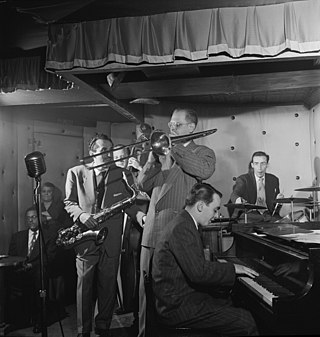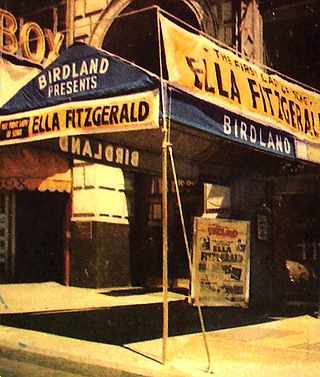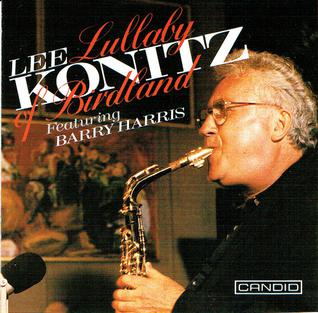
Earl Rudolph "Bud" Powell was an American jazz pianist and composer. A pioneer in the development of bebop and its associated contributions to jazz theory, Powell's application of complex phrasing to the piano influenced both his contemporaries and later pianists including Walter Davis, Jr., Toshiko Akiyoshi, and Barry Harris.

Dillon "Curley" Russell was an American jazz musician, who played bass on many bebop recordings.
"A Night in Tunisia" is a musical composition written by American trumpeter Dizzy Gillespie around 1940–1942. He wrote it while he was playing with the Benny Carter band. It has become a jazz standard. It is also known as "Interlude", and with lyrics by Raymond Leveen was recorded by Sarah Vaughan in 1944.

Jazz at Massey Hall is a live jazz album recorded on 15 May 1953 at Massey Hall in Toronto, Canada. Credited to "the Quintet", the group was composed of five leading "modern" players of the day: Dizzy Gillespie, Charlie Parker, Bud Powell, Charles Mingus, and Max Roach. It was the only time that the five musicians recorded together as a unit, and it was the last recorded meeting of Parker and Gillespie.

Birdland is a jazz club started in New York City on December 15, 1949. The original Birdland, which was located at 1678 Broadway, just north of West 52nd Street in Manhattan, was closed in 1965 due to increased rents, but it re-opened for one night in 1979. A revival began in 1986 with the opening of the second nightclub by the same name that is now located in Manhattan's Theater District, not far from the original nightclub's location. The current location is in the same building as the previous headquarters of The New York Observer.

This is a list of recordings by American jazz alto saxophonist Charlie Parker ("Bird"). Parker primarily recorded for three labels: Savoy, Dial, and Verve. His work with these labels has been chronicled in box sets. Charlie Parker's Savoy and Dial Sessions have been issued on The Complete Savoy Sessions, Charlie Parker on Dial and Complete Charlie Parker on Dial and The Complete Savoy & Dial Master Takes. His Verve recordings are available on Bird: The Complete Charlie Parker on Verve and The Complete Verve Master Takes.
"Ko-Ko" is a 1945 bebop recording composed by Charlie Parker. The original recorded version lists Parker on alto saxophone with trumpeter Miles Davis, double bassist Curley Russell and drummer Max Roach. Due to the absence of Bud Powell, Dizzy Gillespie was enlisted to play piano, instead of his usual trumpet. Pianist Sadik Hakim, then known as Argonne Thornton, was also known to be present at the session. Rumors persist to this day about precisely who played trumpet and piano on this piece; some claim it's young Miles Davis who plays trumpet and Gillespie comping at piano, on both takes; most claim Gillespie plays trumpet and, or instead of, piano; some claim Hakim is the pianist on all or part of one or both of the takes. However, Miles Davis confirms in his autobiography that he did not play trumpet on "Ko Ko":
"I remember Bird wanting me to play "Ko-Ko," a tune that was based on the changes of "Cherokee." Now Bird knew I was having trouble playing "Cherokee" back then. So when he said that that was the tune he wanted me to play, I just said no, I wasn't going to do it. That's why Dizzy's playing trumpet on "Ko-Ko," "Warmin' up a Riff," and "Meandering" on Charlie Parker’s Reboppers, because I wasn't going to get out there and embarrass myself. I didn't really think I was ready to play tunes at the tempo of "Cherokee" and I didn't make no bones about it."

Groovin' High is a 1955 compilation album of studio sessions by jazz composer and trumpeter Dizzy Gillespie. The Rough Guide to Jazz describes the album as "some of the key bebop small-group and big band recordings."
"Billie's Bounce" is a jazz composition written in 1945 by Charlie Parker in the form of a 12 bar F blues. Some sources claim that the song was dedicated to Dizzy Gillespie's agent, Billy Shaw, although according to Ross Russell, Shaw's "name was misspelled" accidentally. However, others claim that the song was in fact dedicated to Shaw's secretary, who was called Billie. The original recording by Charlie Parker and His Re-Boppers was inducted into the Grammy Hall of Fame in 2002.

Dizzy Gillespie and the Double Six of Paris is a 1963 studio album collaboration between Dizzy Gillespie and Les Double Six, also known as the Double Six of Paris, a French vocal group who sings in vocalese to songs associated with Dizzy Gillespie. Gillespie, pianist Bud Powell, and a rhythm section accompany; two of the songs feature his quintet, with James Moody. It was reissued on CD in 1989.

The Charlie Parker 10th Memorial Concert was recorded March 27, 1965, 10 years after the death of Charlie Parker, at Carnegie Hall in New York City. Its A&R director was Bobby Scott and it was released on Limelight Records the same year. It has yet to be reissued on CD.
This article lists Charlie Parker's Savoy and Dial sessions as leader, which were recorded between 1945 and 1948.

Birks' Works is an album by trumpeter Dizzy Gillespie recorded in 1957 and released on the Verve label. The original album featured 10 tracks and was reissued as Birks Works: The Verve Big Band Sessions, a 2 CD compilation featuring unreleased tracks, alternate takes and tracks from Gillespie's previous 1956 albums Dizzy in Greece and World Statesman.
James Theodore Powell was an American jazz saxophonist who played alto sax.

Modern Jazz Trumpets is an album released by Prestige Records in 1951 with music by four jazz trumpeters: Fats Navarro, Dizzy Gillespie, Miles Davis and Kenny Dorham. The album was released on the 10" LP format and includes the first recordings by Davis for Prestige.

The Charlie Parker Story is an LP record by Charlie Parker, released posthumously by Savoy Records. While many of the tracks on this album had been previously released on other formats, this is the first album that chronicles the entire session, recorded November 26, 1945, including all takes of all pieces. This session is famous in that it is the first recorded under Parker's name. It is also controversial, in that to this day it is unclear who the pianist and trumpet player are on all of the tracks.

Lullaby of Birdland is a live album by saxophonist Lee Konitz featuring pianist Barry Harris which was recorded at Birdland in 1991 and released on the Candid label.

Inner Fires is a live album by jazz pianist Bud Powell recorded at Club Kavakos in 1953. Also appearing on the record were bassist Charles Mingus and drummer Roy Haynes. Some releases of the album include recordings of interviews with Powell from 1963, during his stay at the Bouffémount Sanatorium in France.

One Night in Birdland is a live album by saxophone player Charlie Parker, trumpeter Fats Navarro, pianist Bud Powell, bassist Curley Russell, and drummer Art Blakey recorded at Birdland on May 15–16, 1950. Recorded in low audio quality on a private tape, it was released as an LP by Columbia Records.














